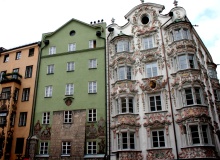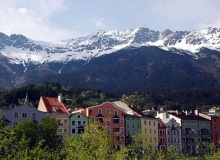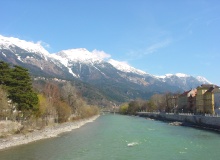Austria
A country offering fairy-tale castles, skiing and spectacular scenery
Austria is full of rich cultural offerings and traditions, many dating from when Vienna was the seat of a powerful empire. This is the country of Mozart and Johann Strauss, music festivals in Alpine settings, the popular New Year’s Eve concerts at the Vienna Staatsoper and the original setting of The Sound of Music.
Travel here offers fairy-tale castles and skiing, spectacular scenery and Sacher torte. The grandeur of Vienna’s imperial buildings matches Austria’s huge romantic streak and its passion for rituals. By contrast, Salzburg is set in a region of spectacular natural beauty and boasts a wonderful array of castles, palaces and ecclesiastical architecture.
Austrians seem to blend a kind of Italian romanticism and charm with a Germanic love for order. Travelling through Austria you can experience that romanticism with something as simple as a hike through the mountains of the Tirol—or as spectacular as a visit to Vienna’s Spanish Riding School, where you can see the magnificent Lipizzaner stallions perform their gravity-defying “airs above the ground.”
Using sound professional expertise and advice, Concierge Traveller can provide any type of travel in Austria, from river cruising to coach excursions or B & B holidays, that would suit an individual traveller’s needs.
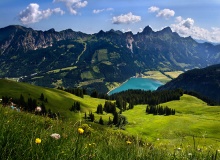

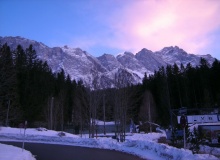
Vienna
Vienna is a unique blend of the historic and the modern. The city’s historic role as the seat of the Hapsburg Empire can be seen in the wealth of grand architecture and in the city’s artistic and musical heritage.
Vienna is divided into 23 districts. The original city that lay within the protective walls comprises the First District of modern Vienna. The demolition of the walls led to the construction of the famous Ringstrasse inside which the majority of tourist attractions are located. The remaining districts extend into the foothills of the Vienna Woods, where there are wine taverns, pretty villages and vineyards.
Vienna’s location on the trade route along the River Danube made it the hub of an empire that once covered a large part of Europe. Today it is the financial and administrative capital of Austria and home to a number of international organisations, including the United Nations.
In the 21st Century, the city is as handsome and elegant as ever, but it feels fresh. With a host of new bars and restaurants to compliment its haughty, imperial monuments, Vienna has rediscovered its joie de vivre.
WHEN TO TRAVEL to Vienna
Weatherwise you might want to miss January's chill, and the heat of July and August - you won't be able to see the Lipizzaners and the Boys' Choir in those summer months anyway. June and September are particularly good times to visit and it's a good idea to opt for the less-crowded spring/autumn shoulder months of April-May and October-November.
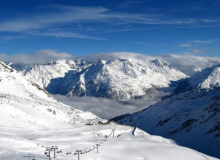
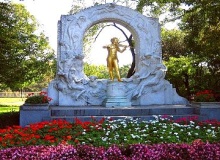
Salzburg
Salzburg, on the Salzach River, the former site of a Roman town, is set against a pristine mountain backdrop. The city was named after the early residents who earned their living in the region's salt mines. Mozart was born here in 1756 and the city’s association with the composer continues to draw a multitude of tourists.
Salzburg, a city of 17th and 18th Century houses, is recognised for its architectural grandeur. The Salzburg Cathedral is one outstanding example. Several beautiful castles and palaces also dot the city: Hohensalzburg Fortress, the Residenz palace and Schloss Hellbrunn, 5kms south of the city, a summer residence of former prince-archbishops.
The city is the setting for The Salzburg Festival, a world-renowned annual event that attracts music lovers, especially Mozart fans, from all over the globe. The hills around Salzburg were also the setting for one of the world’s most instantly recognisable films - The Sound of Music!
Since the end of World War II, Salzburg was a part of the American zone and economic development began right at the end of the war, giving the city a 10-year head start over the remaining regions of Austria and cementing its links with the USA.
WHEN TO TRAVEL to Salzburg
Salzburg, has long, dry, snow-laden winters and short, hot summers. Summer is a busy and exciting season, thanks partly to the Salzburg Festival. In winter a ski shuttle service ferries snow lovers to surrounding resorts and in town, December brings a world of Christmas markets, glühwein, and carols.
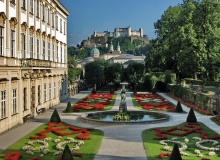
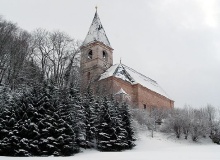
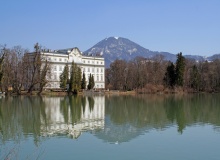
Innsbruck
Innsbruck, known as the capital of the Alps, has twice been selected as the site of the Winter Olympics. The capital of the picturesque state of Tirol, Innsbruck is set at the base of the spectacular Alps, 375 kms southwest of Vienna and it certainly merits at least a few nights stay. The city is fairly compact with an old town that evokes ideas of the Middle Ages, and walking is a perfect way to appreciate it fully.
As an 800-year-old university town, Innsbruck offers many art treasures, numerous fine buildings such as, the famous Golden Roof with its hybrid of Gothic and Baroque architecture. Of the city's museums and collections, one of the most entertaining is at Schloss Ambras. This castle includes medieval armour and weapons, paintings of the Austrian royal family and curious collectibles.
For skiers, there is usually good snow from early December to mid-April. The winter ball season is nearly as exhaustive—and exhausting—as Vienna's.
WHEN TO TRAVEL to Innsbruck
Due to its altitude and position in Central Europe, far from the coast, Innsbruck has an alpine climate. Winter is cold and snowy. And winter nights can get frigid, occasionally dropping to -12°C.
Spring is brief; days start to get warm, often over 15°C, but nights remain cool or even freezing.
Summer is highly variable and unpredictable. Days can be rainy, or sunny and extremely hot. In summer, as expected from an alpine climate, the daytime temperature variation is often very high as nights always remain cool.
